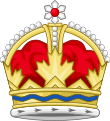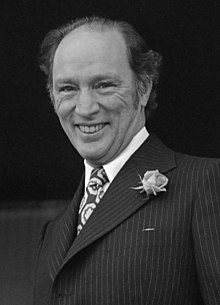 |
|---|
The official languages of Canada are English and French,[1] which "have equality of status and equal rights and privileges as to their use in all institutions of the Parliament and Government of Canada," according to Canada's constitution.[2] "Official bilingualism" (French: bilinguisme officiel) is the term used in Canada to collectively describe the policies, constitutional provisions, and laws that ensure legal equality of English and French in the Parliament and courts of Canada, protect the linguistic rights of English- and French-speaking minorities in different provinces, and ensure a level of government services in both languages across Canada.[3]
In addition to the symbolic designation of English and French as official languages, official bilingualism is generally understood to include any law or other measure that:
- mandates that the federal government conduct its business in both official languages and provide government services in both languages;
- encourages lower tiers of government (most notably the provinces and territories, but also some municipalities) to conduct themselves in both official languages and to provide services in both English and French rather than in just one or the other;
- places obligations on private actors in Canadian society to provide access to goods or services in both official languages (such as the requirement that food products be labelled in both English and French);
- provides support to non-government actors to encourage or promote the use or the status of one or the other of the two official languages. This includes grants and contributions to groups representing the English-speaking minority in Quebec and the French-speaking minorities in the other provinces to assist with the establishment of an infrastructure of cultural supports and services.
At the provincial level, the Constitution Act, 1982 recognizes and guarantees the equal status of French and English in New Brunswick. While French has equal legal status in Manitoba restored due to a court ruling, Reference re Manitoba Language Rights, that struck down seventy-year-old English-only laws in 1985, in practice, French language services are only provided in some regions of the province.[4] Quebec has declared itself officially unilingual (French only). Alberta and Saskatchewan are also considered unilingual (English only).[5] In practice, all provinces, including Quebec, offer some services in both English and French and some publicly funded education in both official languages up to the high school level (English-language post-secondary education institutions are also present in Quebec, as are French language post-secondary institutions in other provinces, in particular in Manitoba, Ontario and New Brunswick). English and French are official languages in all three territories. In addition, Inuktitut is also an official language in Nunavut, and nine aboriginal languages have official status in the Northwest Territories.

- ^ Toolkit, Web Experience (30 March 2014). "Canada's official languages and you". www.clo-ocol.gc.ca.
- ^ "Subsection 16(1) of the Constitution Act, 1982". 13 December 2013. (See Section Sixteen of the Canadian Charter of Rights and Freedoms.)
- ^ "Official Languages Act – 1985, c. 31 (4th Supp.)". Act current to July 11th, 2010. Department of Justice. Archived from the original on 5 January 2011. Retrieved 15 August 2010.
The purpose of this Act is to (a) ensure respect for English and French as the official languages of Canada and ensure equality of status and equal rights and privileges as to their use in all federal institutions, in particular with respect to their use in parliamentary proceedings, in legislative and other instruments, in the administration of justice, in communicating with or providing services to the public and in carrying out the work of federal institutions; (b) support the development of English and French linguistic minority communities and generally advance the equality of status and use of the English and French languages within Canadian society; and (c) set out the powers, duties and functions of federal institutions with respect to the official languages of Canada.
- ^ "French Language Services Policy" (PDF). Government of Manitoba. March 1999.
- ^ "Pas de statut bilingue pour l'Alberta et la Saskatchewan, tranche la cour". Quebec.huffingtonpost.ca. 21 February 2014. Retrieved 29 October 2015.
- ^ "Pierre Elliott Trudeau - Biography & Facts". Encyclopedia Britannica. 3 August 2023.